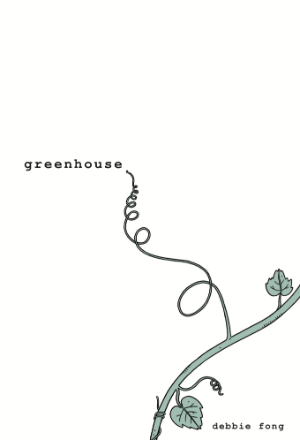 As the rise of graphic medicine has underlined over the last few years, sequential art is a uniquely empathetic medium for expressing the experience of living with mental health issues. So much so that we’ve tagged all our recent coverage in one place here at Broken Frontier in order to make this important work as easily accessible to our audience as possible. From deeply affecting personal autobiographical accounts to thoughtful visual metaphor, the breadth of approaches in this field has produced some outstanding comics practice; sequential art that has made an immediate and lasting connection with its readership.
As the rise of graphic medicine has underlined over the last few years, sequential art is a uniquely empathetic medium for expressing the experience of living with mental health issues. So much so that we’ve tagged all our recent coverage in one place here at Broken Frontier in order to make this important work as easily accessible to our audience as possible. From deeply affecting personal autobiographical accounts to thoughtful visual metaphor, the breadth of approaches in this field has produced some outstanding comics practice; sequential art that has made an immediate and lasting connection with its readership.
Debbie Fong’s Greenhouse merges the everyday and the allegorical in a quietly powerful account of an unnamed young woman’s self-imposed seclusion. Part slice-of-life character study and part social commentary, Greenhouse gives us a central character who hasn’t left her apartment in five years and who gradually develops a growing obsession with the world of botany.
With information and supplies only ever a click and a delivery away from realisation, she begins to turn her entire living space into a nursery for plants. Haunted by eerie representational dreams of jungle habitats that mirror her own mindscape, the lines between reality and imagination gradually begin to collapse and coalesce as her apartment and the natural world become indistinguishable…
Fong builds up a feeling of self-imprisonment and claustrophobia in Greenhouse by either framing events from her protagonist’s viewpoint in tight, stifling, multi-panelled pages or, when we do observe her from our own perspective, by obscuring our perception of her. Text boxes are placed across her face, her visage is fleetingly seen only partially in reflection, or she stares out masked from hallucinatory foliage at us, mostly hidden by the undergrowth. Ironically, as she surrenders more to her illusory world so too does she become more distinct as a presence.
With echoes of Max’s descent into dream-state in Where the Wild Things Are, this Sendak-ian domestic transformation embraces fundamental contradictions. Confinement and comfort become one and the same while the visual metaphor that defines the character’s existence is both grotesque and yet oddly beautiful.
Fong builds her story slowly and crafts it with care, constructing a nebulous sense of passing time in her page structure that underlines the hazy, dreamy state that permeates every page. Interspersed botanical textbook interludes further accentuate the shifts between reality and something other, with the comic’s quiet denouement adding potential brutal revelation to the apparent allegory that precedes it. Greenhouse is a subtle, nuanced and uncompromising read from an artist whose verbal economy proves a potent storytelling tool.
For more on the work of Debbie Fong visit her website here and follow her on Twitter here. Greenhouse is published by Pommo Press and available from her online store here.
For regular updates on all things small press follow Andy Oliver on Twitter here.





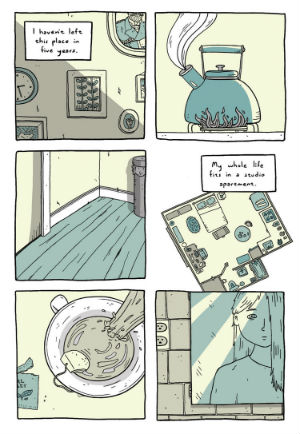
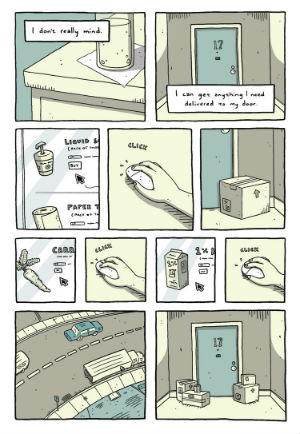
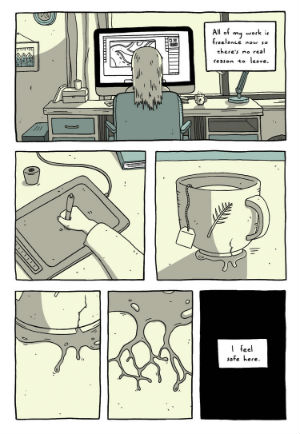
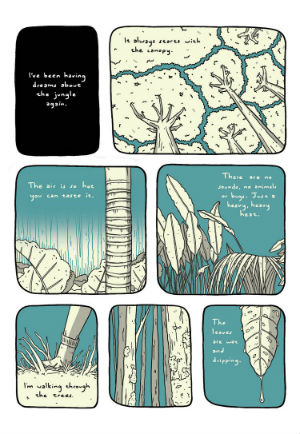


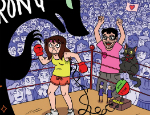







[…] Andy Oliver reviews GREENHOUSE by Debbie Fong, “a subtle, nuanced and uncompromising read from an artist whose verbal […]